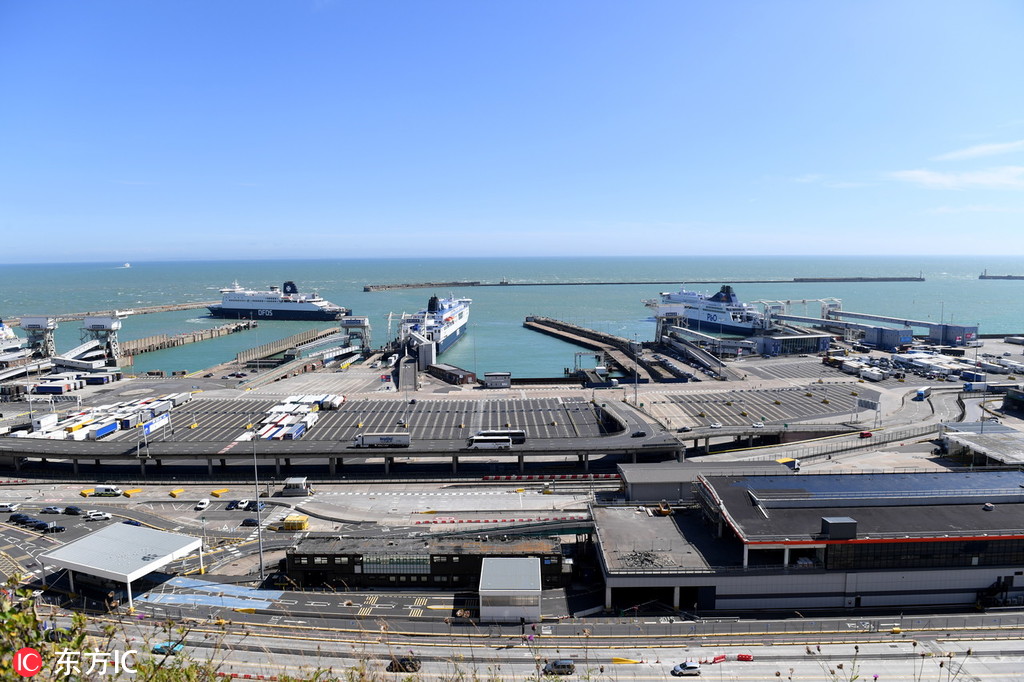UK's Port of Dover braced for leaving EU
By Jonathan Powell in London | chinadaily.com.cn | Updated: 2019-03-13 05:46

As the United Kingdom’s key transport and logistics hub, the Port of Dover has been the focus of huge public scrutiny on trade and the efficient movement of goods, particularly around the possibility of Great Britain leaving the European Union at the end of March without a deal.
Every year the port in Kent in the southeast of England handles more than 2.6 million heavy goods vehicles, or HGVs, and also up to 122 billion pounds ($160 billion), or 17 percent, of the UK’s trade in goods. It manages nearly half of all the freight traffic moved to and from the EU, making it the UK’s largest roll-on roll-off port (for ships designed to carry wheeled cargo).
In a no-deal Brexit scenario, reports have suggested that delays caused by customs checks on either side of the English Channel could lead to huge queues of HGVs trying to get into the Ports of Dover and Calais in France.
British goods going to the EU will be subject to duty (a payment, for example on imports and exports), and will need to be checked for compliance with things such as sanitary regulations.
Goods arriving in the UK from the EU could face checks too, though the government has said it will not do that straight away, partly because it does not have the infrastructure.
The government’s document on the impact of a no-deal Brexit on business and trade, published on Feb 26, admits some of the consequences would be profound. The report says the flow of goods under a no-deal Brexit through Dover would be “very significantly reduced for months”.
Preparing for no-deal
UK Transport Secretary Chris Grayling’s proposal to use alternatives to the Dover-Calais route as a means of coping with the impact of a possible no-deal Brexit, caused a dispute with the French port, whose CEO said the plans were unnecessary. Grayling then faced huge criticism for a bungled ferry deal with Seabourne Freight, a company that had no ferries whatsoever.
Since then, the government has sought to allay fears, promising that lorries coming into the UK will be able to drive straight off ferries and Channel Tunnel trains by filling in a frontier declaration beforehand.
To manage traffic gridlock around the Port of Dover, Highways England, Kent County Council and Kent Police have planned Operation Brock — for parking up to 13,000 trucks along motorways and in a nearby airfield. In January, UK officials staged an exercise involving a convoy of 89 lorries at the disused airport as part of their contingency plans.
The government said it intended to boost its Border Force staff, including customs officers at Dover, with up to 900 new recruits. A readiness task force has also been recruited in preparation for any sudden EU exit without a transition period.
The Port of Dover insists it is capable of handling any disruption and that its entire operating system — the port and its infrastructure, border controls and ferry operations — is designed around the fast-paced, seamless movement of traffic.
“Throughout the Brexit debate, what people have desired is certainty,” said Port of Dover Chief Executive Doug Bannister.
“Uncertainty is continuing, but we are prepared. We will continue to manage our infrastructure professionally and our team stands ready to handle whatever comes our way. We look forward to welcoming customers on (scheduled Brexit date) March 29, March 30 and far into the future.”
Lack of certainty
Representing road transport operators in the UK, the Road Haulage Association, also known as the RHA, takes a contrary position, saying insufficient work and planning has been done and that plans for a no-deal Brexit were “dire”, with the sector facing catastrophe on March 30.
The RHA’s director of policy, Rod McKenzie, told China Daily: “In very simple terms, it’s a disastrous situation we’re facing. The government has only recently started planning for a no-deal. It’s too little, too late. The information and customs documentation required has not been supplied.
“We need a deal, or a transition period or we need something that buys us more time that allows time to get to a place where we can have certainty. Businesses like certainty, and we don’t have it.
“Without a deal, all goods vehicles would need an international road haulage permit, known as an ECMT, but there are not enough to go round — about 30,000 lorries need them and we only have 2,000 — so it’s not enough,” said McKenzie.
Readiness across the Channel
Last week, a union protest by French customs officers aiming to show the disruption that could unfold under a no-deal Brexit caused long tailbacks around Calais. There were also delays to Eurostar train services as officials launched similar protests at Paris’s Gare du Nord station.
Customs agents wanted to get the message across to the French government that they were simply not ready for Brexit. Without extra funding and staffing ahead of the deadline, they say, ports, train stations and the tunnel linking Britain and France will face mayhem.
Jean-Marc Puissesseau, the chief executive of Calais port, told China Daily that 6 million euros ($6.7 million) had been spent preparing for a no-deal scenario and expressed disdain for the union protest.
“It’s completely silly for them to block the system and create traffic jams, and it is not the truth to say that this is how it will be during the Brexit process,” he said.
“It is not an example of how it will be. It is wrong. It is irresponsible. We will be ready for Brexit on March 29. Since mid-January, we began work, such as installations for parking, sanitary controls and for French customs officers. This will be completed on March 22, one week before the Brexit deadline date.”
The French government has announced plans to increase the number of customs officers in response to Brexit. The 300 deployed at the Channel Tunnel will be increased to 365 while the 64 at Calais port will almost double.
“We are prepared, regardless of the negotiations, for a hard Brexit,” said Puissesseau. “If Britain becomes a so-called third country, we only need customs documents to process the trucks through. If there is a deal, we will adjust our process as needed. The traffic will be managed. Fluidity is the key.”
Form-filling frustrations
The UK’s road transport workers do not agree. “We think it is very far from certain there will be smooth flow at Dover or Calais,” said Rod McKenzie. “What we’re worried about is the reality of the form-filling involved.”
Calais has wider open spaces than Dover and has invested more in the infrastructure of checks, such as the customs booths they have built. Dover has a much narrower road circuit going into the town, narrower roads, and nowhere to put lorries if they are stopped for checks, all of which, McKenzie says, “would cause chaos on the adjoining motorways”.
“We know that even a two-minute check-in on Dover on a lorry will create a substantial tailback in a very short space of time,” he said. “So, 30 minutes of two-minute checks would cause a 20-mile queue, backing up through Dover and on to the surrounding motorways. It would be very serious.
“In Calais, we’re getting a taste of it already, with customs staff there taking industrial action. It indicates difficult times ahead, and it would be worse in Dover.”
Possible capacity constraints
Global shipping consultancy Drewry Maritime Advisors found that the Port of Dover will be able to cope with moderate disruption arising from Brexit and “would be able to absorb significant overflow in the event of capacity constraints”.
Drewry’s independent study found that Dover has the border control, check-in, and berth capacity to cope with existing demand. It also found that Dover would be able to cope with a 50 percent increase in process times in key areas, although traffic peaks would need to be managed.
The Port of Dover has stated that it accepts “external factors such as border controls may slow things down”, but says they will do that at every EU-facing gateway “across the country”.
It added: “What makes Dover different is that is has the experience of how to deal with major disruption and find a way through — nowhere else has this experience.”
The port has said that “preparation is the key” to coping with Brexit, but that the government must lead on guidance to logistics companies that use its facilities.
The two main ferry operators out of Dover, P&O and DFDS, have said they are well prepared.
“We have been engaging closely with the authorities on both sides and they have given us (the understanding) that they are fully aware of the economic and commercial importance of the free flow of traffic across their borders,” said a statement from P&O. “We expect them to act to mitigate the impact of any reintroduced customs and sanitary controls so that our customers can continue to rely on our services for the import and export of vital goods.”
Kasper Moos, managing director of DFDS in Dover, said that his company had been, “intensifying work to ensure that customers are preparing for new border processes in order to protect their businesses and keep people and goods flowing through this vital trade route”.























